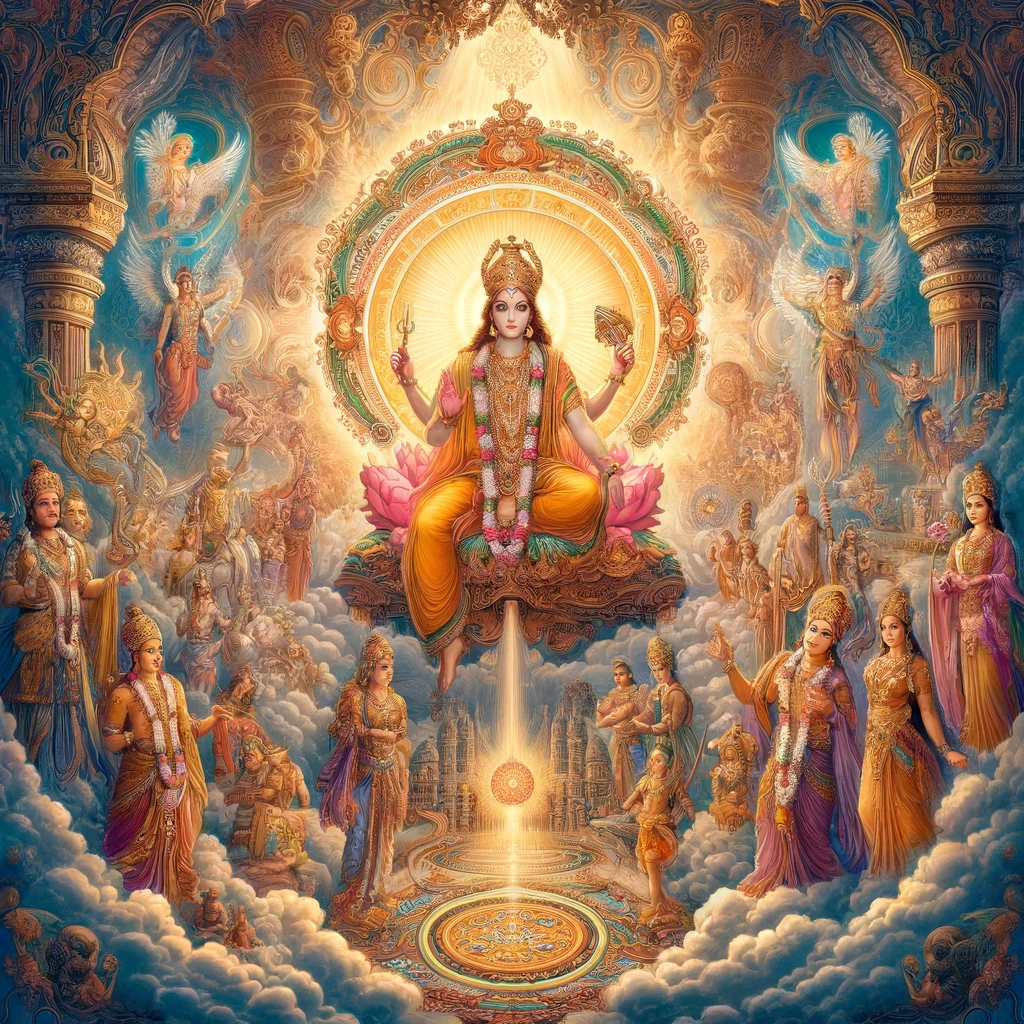ಗುರುಃ ಗುರುತಮಃ ಧಾಮಃ ಸತ್ಯಃ ಸತ್ಯಪರಾಕ್ರಮಃ
ನಿಮಿಷಃ ಅನಿಮಿಷಃ ಸ್ರಗ್ವೀ ವಾಚಸ್ಪತಿಃ ಉದಾರಧೀಃ
gururgurutamo dhāmaḥ satyaḥ satyaparākramaḥ
nimiṣonimiṣaḥ sragvī vācaspatirudāradhīḥ ||23||
Guru (ಗುರುಃ)
Inside every giver of knowledge exists the embodiment of knowledge, and God, who manifests this knowledge, is the Guru. God is the Guru who has imparted all the Vedic wisdom.
Gurutamah (ಗುರುತಮಃ)
"I worship Krishna, the teacher of the world." "ಕೃಷ್ಣಂ ವಂದೇ ಜಗದ್ಗುರುಂ". There is no greater teacher than God Himself. God, who is even the Guru of deities like Brahma, is Gurutamah, the highest of teachers.
Dhama (ಧಾಮಃ)
'Dhama' conveys the meanings of shelter, home, and brilliance. God is the ultimate home where we all must eventually converge. He is the refuge for everyone. For this reason, the revered devotees have said, "There lies our true home, what we have here is merely temporary." Breaking down this name: Dhā+Am=Dhama. Here, 'Dhā' means bearer or supporter, and 'Am' means boundless or limitless. There are many sustaining powers in this world. For the deities, Indra is the sustainer; for Indra, Garuda, Shesha, and Rudra are the sustainers; and they, in turn, are sustained by Brahma and Vayu. Mother Lakshmi supports Brahma and Vayu. The sustaining power of all these entities has limits. God, the foundation of all, is the limitless sustainer, the embodiment of knowledge and bliss.
Satyah (ಸತ್ಯಃ)
The literal meaning of the name 'Satya' is "one who is full of virtues." God alone is complete. Hence, in the peace invocations of the Vedas, it is said: Purnamadah purnamidam purnat purnamudachyate Purnasya purnamadaya purnamevavashishyate Om Shanti Shanti Shanti (ಪೂರ್ಣಮದಃ ಪೂರ್ಣಮಿದಂ ಪೂರ್ಣಾತ್ ಪೂರ್ಣಮುದಚ್ಯತೇ, ಪೂರ್ಣಸ್ಯ ಪೂರ್ಣಮಾದಾಯ ಪೂರ್ಣಮೇವಾವಶಿಶ್ಯತೇ, ಓಂ ಶಾಂತಿಃ ಶಾಂತಿಃ ಶಾಂತಿಃ) This means "That is whole, and this is whole. From the whole comes the whole; when the whole is taken from the whole, the whole indeed remains." God, who is complete with all virtues, is Satyah. As stated in the auspicious invocation of the Bhagavata: Dhamnasvena sada nirasta-kuhakam satyam param dhimahi (ಧಾಮ್ನಾಸ್ವೇನ ಸದಾ ನಿರಸ್ತ-ಕುಹಕಂ ಸತ್ಯಂ ಪರಂ ಧೀಮಹೀ ) This means God is the embodiment of existence, consciousness, and bliss. Therefore, God is described as: "Satyam Jnanam Anantam Brahma." "ಸತ್ಯಂ ಜ್ಞಾನಂ ಅನಂತಮ್ ಬ್ರಹ್ಮ" Creation, preservation, dissolution, regulation, knowledge, ignorance, bondage, and liberation—these eight extraordinary actions belong to God, who is Satyah.
Satyaparakramah (ಸತ್ಯಪರಾಕ್ರಮಃ)
Here, 'para' means enemies or the wicked. 'Parakrama' signifies the capability to defeat enemies. The valor of God is 'complete' or 'true'. To eradicate the internal foes such as desire, anger, arrogance, and envy, we must seek refuge in God. As stated in the Quran, "Drive them out from where you have been driven out," which means to expel the mental flaws that obstruct spiritual practice and to establish the domain of the inner self. These internal enemies prompt our senses to engage in wrongful deeds. Because of them, the eyes wish to see what is not right, the ears long to hear what is improper, and the mouth speaks ill. Thus, these adversaries push our true nature away from us. To overcome these internal enemies, we must seek shelter in God, who is the true hero. "I lack the strength to defeat the enemies within me; only You can remove all obstacles and save me from these foes, guiding me on the path of truth." We should pray to God, "Contemplating the pleasant-faced, four-armed Vishnu, who is clad in white, may all obstacles be pacified." God alone is the destroyer of all obstacles and the embodiment of true valor. Thus, to subdue the evil within and without, we must seek refuge in God, who is Satyaparakramah.
Nimishah (ನಿಮಿಷಃ)
'Nimishah' means the one who blinks or closes the eyes in sleep. Here, it refers to the cosmic sleep or yoga-nidra of God during the time of dissolution (pralaya)
Animishah (ಅನಿಮಿಷಃ)
'Animishah' is the opposite of 'Nimishah'. It means that God never sleeps! He is beyond the need for sleep. In other words, God does not sleep like we do. His 'sleep' is an ever-watchful state of meditation.
Sragvi (ಸ್ರಗ್ವೀ)
'Sragvi' means the one who wears a garland. God is often referred to as Pankaja-nabha (one with a lotus-navel), Pankaja-netra (one with lotus-eyes), Pankaja-angri (one with lotus-feet), and Pankaja-mali (the one garlanded with lotuses). Pankaja-nabha, because He bears the universe in His navel; Pankaja-netra, for He is the overseer of the world; Pankaja-angri, as the cosmos is but a speck of dust at His feet; hence, He is Pankaja-mali or Sragvi, the creator garlanded with countless universes. Another meaning of Sragvi is the one who wears a garland of Tulsi leaves, which is very dear to God, especially in the form of Krishna who is always adorned with a forest garland and cherishes any garland offered with devotion.
Vachaspatih (ವಾಚಸ್ಪತಿಃ)
The master of the goddess of speech or the lord of all speeches. Being Vachaspati doesn't mean one who speaks many languages. Even animals have their own languages, but we do not understand them. Language has evolved through four stages: Para, Pashyanti, Madhyama, and Vaikhari. 'Para' is the most subtle form of language, the vibration that originates in the navel in accordance with the thoughts of the mind. 'Pashyanti' is the state where the subtle language emerges from the navel and becomes manifest in the heart. Following this, the language that emanates through the throat is 'Madhyama'. Finally, the sound that comes out through the mouth is 'Vaikhari'. Thus, God, who understands the various stages of language, is Vachaspatih. For this reason, we can worship God in any language, and He understands even the unspoken language of our navel and heart.
Udaradhih (ಉದಾರಧೀಃ)
'Udaradhih' means a noble or expansive intellect, or the highest form of knowledge. God is omniscient, knowing all things


